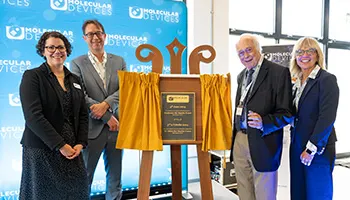Today, Molecular Devices, LLC., a leading high-performance life science solutions provider, officially opened its custom-built site in Cardiff, UK. The multi-million-pound facility was custom-built for the company’s proprietary bioprocess workflow and unique bioreactor technology that enables the quality-controlled manufacturing of patient-derived organoids (PDOs) at scale. High volumes of 3D Ready™ reproducible PDOs are offered as a bespoke service and cryopreserved in an assay-ready format. These can be thawed, plated, and used as desired by researchers.
 From Left to Right: Mary Duseau, President, Molecular Devices – Victoria Marsh-Durban, Director, Custom Organoid Services, Molecular Devices – Robert Vries, CEO HUB Organoids – Professor Sir Martin Evans, Nobel Laureate. Image Credit: Molecular Devices, LLC
From Left to Right: Mary Duseau, President, Molecular Devices – Victoria Marsh-Durban, Director, Custom Organoid Services, Molecular Devices – Robert Vries, CEO HUB Organoids – Professor Sir Martin Evans, Nobel Laureate. Image Credit: Molecular Devices, LLC
Mary Duseau, President of Molecular Devices said, “Molecular Devices is the only company to commercially manufacture PDOs in single batches large enough to support screens of more than 20,000 compounds. With our new facility, we now have the capacity to manufacture 300 million PDOs annually. Given the utility of PDOs for precision medicine and predictive toxicology, their expanded availability for use in drug discovery will reduce the time and cost of bringing new life-saving therapies to the market.”
Dr. Robert Vries, CEO of HUB Organoids, the inventors of the proprietary Organoid technology and long-time collaborator of Molecular Devices said, “At HUB Organoids, we recognize the immense potential of organoids and are committed to advancing this cutting-edge technology. Opening this state-of-the-art facility marks a pivotal moment in the field, as Molecular Devices, one of our key licensees, can now grow organoids at scale to meet the growing demands of researchers worldwide. It not only enables them to accelerate progress in understanding human biology and disease mechanisms but also sets their customers up for breakthroughs in drug discovery and personalized medicine.”
Nobel Laureate Professor Sir Martin Evans unveiled a plaque at the launch event. Evans was awarded the 2007 Nobel Prize for Medicine for ground-breaking discoveries concerning the discovery of mammalian embryonic stem cells and DNA recombination. Throughout his tenure as Head of the School of Biosciences at Cardiff University, Evans championed the innovative 3D organoid cell culture research undertaken in Professor Trevor Dale’s on-campus lab that—alongside Bath University—gave rise to the start-up biotech company Cellesce, acquired by Molecular Devices in 2022.
I am very pleased to see the developmental potential of human stem cells being so effectively leveraged in organoids for facilitating pharmaceutical research.”
Professor Sir Martin Evans
In 2023, the Welsh Government unveiled a Manufacturing Plan for Wales to continue growing the country’s thriving industry. The manufacturing sector, which includes life sciences, contributes over 16% to Wales’ national economic output, nearly double the UK average. Molecular Devices’ new manufacturing facility aligns with this plan, as well as with the UK Government’s national vision for engineering biology.